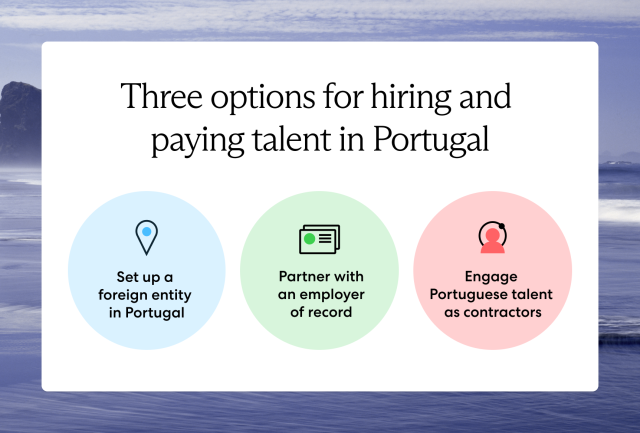Expanding your global workforce to Portugal offers numerous advantages, including a pool of skilled remote workers and a well-developed education system and business infrastructure, making it a potentially cost-effective destination for companies seeking top talent.
Strategically located, Portugal offers access to diverse markets, including Europe, Africa, and South America. Also, English proficiency is notably high, particularly among the younger population and in urban areas.
Interested in hiring employees in Portugal from another country? Learn your hiring options below, employment laws to consider, and how to avoid compliance risks.
How do I employ someone in Portugal?
Navigating employment in Portugal offers three main avenues: setting up a foreign entity, partnering with an employer of record (EOR), or engaging contractors. Let’s explore each:

1. Set up a foreign entity in Portugal
Having an entity in Portugal means establishing a legal presence there, like a branch or subsidiary.
Establishing a foreign entity allows your company to operate within the legal framework of Portugal and compliantly conduct business like hiring talent and running payroll in-house. It's a strategic move for expanding market reach and accessing new opportunities globally.
The downside of entity establishment is that it’s expensive, time-consuming, and requires in-depth knowledge of Portugal's employment, payroll, legal, and corporate regulations.
2. Partner with an employer of record (EOR) in Portugal
A simpler alternative to entity establishment is partnering with an EOR in Portugal to hire and pay talent. An EOR allows foreign employers to unlock the power of global expansion without the legal complexities and wait time of setting up an entity.
An EOR handles all elements of hiring employees in Portugal, from onboarding and benefits to payroll and risk mitigation, so you can focus on leading day-to-day employee tasks and business operations. An EOR is familiar with Portuguese labor laws, ensuring your business complies with local legislation.
With an EOR, your business can jumpstart its growth in Portugal rather than wait weeks or months.
Learn more: What Is an Employer of Record (EOR)?
3. Engage contractors in Portugal
Companies looking to build their Portuguese team quickly may choose to hire and pay Portuguese contractors instead of hiring employees. A contractor provides their services as self-employed, allowing companies flexibility and cost savings when targeting temporary projects or specialized services.
Engaging contractors does not require entity establishment in the country, nor do employers have to pay employment taxes or provide benefits and equipment to contractors.
Still, while engaging international contractors has benefits, foreign companies risk misclassification and could face back taxes and other costly legal penalties. We explain misclassification risks in more detail below.
How much does it cost to hire an employee in Portugal?
The cost of hiring an employee in Portugal is roughly 25% of an employee’s base salary due to mandatory employer contributions to social security and labor accident insurance.
Also, consider additional employee costs when hiring in Portugal, including costs related to recruiting, onboarding, and supplemental benefits you may offer your Portuguese talent.
Interested in hiring employees in Portugal? Use our employee cost calculator below to get reliable insights into employee costs and payroll contributions in Portugal:
What to know before hiring employees in Portugal
Portugal's labor laws are complex for companies aiming to hire in the country, requiring careful navigation of regulations governing employment contracts, different types of leave, termination, and more.
Portugal employment laws
Here are several employment laws and procedures that apply to companies hiring talent in Portugal:
- Employment contracts. In Portugal, the terms of employment are typically agreed to in writing, but it’s not always legally required. However, some arrangements are required to be in writing, such as the employee’s place of work, work hours, and remuneration.
- Probationary period. The probation period is 90 days for permanent employees, 180 days for high-complexity roles, and 240 days for senior or management positions.
- Minimum wage. In 2024, Portugal's minimum wage is €822.50 per month, approximately €4.40 per hour.
- Working hours. Normal working hours in Portugal can’t exceed eight hours per day and 40 hours per week.
- Overtime. Overtime in Portugal is 50% of normal pay unless the employee works on Saturdays after 1:00 p.m. or on Sundays and holidays—in which case overtime pay is 100% of normal pay. Overtime must not exceed 3 hours per day, 30 hours per month, or 200 hours per year.
- Paid time off (PTO). Employees in Portugal get 22 days of paid leave per year, not including holidays.
- Parental leave. Mothers receive 120 days of paid leave. Qualified fathers receive 20 days of paid leave. After initial parental leave, parents can extend their leave to 180 days at 83% of their total pay, shared between them—or extend only maternity leave to 150 days at 80% of their total pay.
- Sick leave. Benefits vary with the duration of the illness: 55% of one’s salary for up to 30 days, increasing to 60% of one’s salary for 31-90 days, further rising to 70% of one’s salary for 91-365 days, and reaching 75% of one’s salary for over a year.
- Termination. Termination in Portugal is only allowed on the grounds of just cause. For permanent contracts, the notice period is 30 days for up to two years of service and 60 days for more than two years of service. For fixed-term or temporary contracts, the notice period is 15 days.
- Severance. Severance pay in Portugal, contingent on factors like the contract, termination reason, and employee role, requires a minimum of 18 days' salary rate for the first three years and 12 days for each subsequent year of service.
- Holidays. Portugal observes a total of 13 national public holidays throughout the year, as well as various local holidays per jurisdiction.
13th and 14-month pay in Portugal
In Portugal, 13th-month pay and 14th-month pay are two mandatory additional salary payments called "Subsídio de Natal" (Christmas bonus) and "Subsídio de Férias" (Holiday bonus). The intention is to help employees with extra expenses for holidays and vacations, and both bonuses are equivalent to one month's salary.
Portugal payroll regulations
Portugal's payroll regulations dictate the framework for pay frequency and contribution amounts.
Pay frequency
Portugal’s payroll cycle is typically bi-weekly, with employees receiving pay every two weeks.
Employee and employer contributions
Employers and employees each contribute to social security. Employers contribute 23.75% of their employee’s gross salary to social security, and employees contribute 11% of their gross salary.
Employers must also buy an insurance premium to cover labor accidents, and the premium varies based on employee occupation and risk classification.
In 2023, resident employees in Portugal are taxed on their gross income at progressive rates varying from 14.5% to 48% while non-resident employees in Portugal are taxed a flat 25% of their gross income.
Compliance risks when hiring employees in Portugal from another country
When hiring in Portugal, employers must comprehend the country's policies mandating employment, how they apply, and the risks involved if they want to maintain global compliance.
Varying labor and employment laws
Like all countries around the world, Portugal has its own labor regulations that foreign employers must adhere to, which can be daunting to understand, navigate, and comply with. Compliance is essential to managing a global workforce—failure to do so results in serious fines and legal consequences.
Employers hiring talent in Portugal must orient themselves with local labor laws to guarantee compliance with their onboarding, employment, payroll, benefits, and termination methods.
Incorrect payroll contributions
Portugal also has its own legislation on employer contributions, which directly affect payroll items like your employee's take-home pay and social security.
There are severe penalties for incorrect payroll contributions in Portugal, including administrative fines, interest charges, and more. Along with monetary setbacks, payroll compliance errors can impact employee morale.
Worker misclassification
Improper classification is more risky if a company engages contractors instead of hiring employees. When hiring Portuguese contractors, an international company must assess tax laws and reporting in both their country and Portugal to avoid misclassification. Misclassification leads to legal issues, fines, and employee entitlement back pay.
Permanent establishment
If your company has a fixed location in Portugal and generates revenue, you have a permanent establishment and are liable to local Portuguese taxes.
It can be advantageous to have an established presence in another country. However, knowing the corporate tax rates applicable in that region for a permanent establishment is crucial. Failing to identify an establishment can result in various risks, such as unpaid taxes, employer obligations, penalties, interest charges, and potential legal complications.
Immigration requirements
A company may transfer international talent to live and work in Portugal. If so, they must understand and comply with the country's immigration laws.
Securing Portugal work visas and permits for foreign employees in Portugal depends on factors such as the employee's job, duration of stay, and whether a spouse and dependents accompany them.
Generally, the employer sponsors the employee, manages the work visa application process, and covers the relevant fees. The employee is required to obtain an entry permit, followed by a residency permit and work visa from the local Portuguese embassy or consulate.
Portugal embraces foreign workers: In October 2022, the country began issuing digital nomad visas for remote workers to work and live in Portugal temporarily.
Simplify hiring employees in Portugal with Velocity Global
Hiring employees in Portugal offers many advantages for companies looking to expand internationally or build a distributed workforce. However, understanding and complying with the country's local employment laws is complicated, overwhelming, and legally risky for foreign businesses.
Instead, partner with an EOR to simplify global hiring and payroll complexities and make building and managing a global workforce easier.
As an industry-leading EOR, Velocity Global allows you to quickly and compliantly hire, pay, and manage employees in Portugal and more than 185 countries without the need for entity establishment or legal know-how.
Our EOR solution handles onboarding, payroll, benefits, HR support, and risk mitigation so you can focus on building a top team in Portugal and beyond.
Ready to engage talent in Portugal with speed and compliance? Contact Velocity Global to learn about our global workforce solutions.
Disclaimer: The intent of this document is solely to provide general and preliminary information for private use. Do not rely on it as an alternative to legal, financial, taxation, or accountancy advice from an appropriately qualified professional. © 2024 Velocity Global, LLC. All rights reserved.
Topic:
Country Guides



